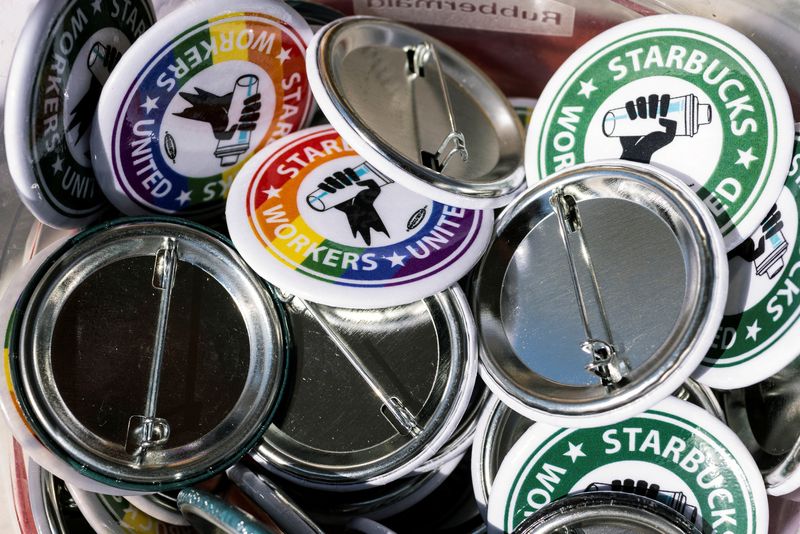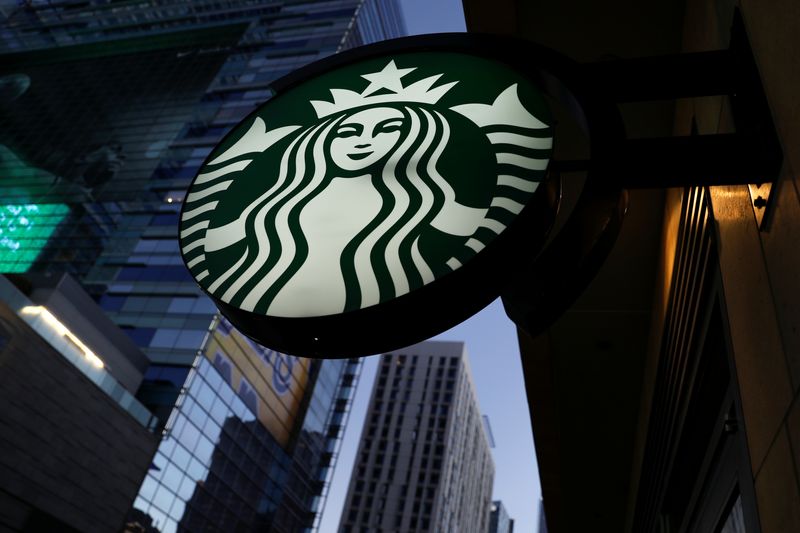By Deborah Mary Sophia
(Reuters) -More than 3,000 workers at over 150 Starbucks (NASDAQ:SBUX) stores in the United States will walk off the job over the next week, the union representing the coffee chain's baristas said on Friday, following claims the company had banned Pride Month decorations at some of its cafes.
The strikes are also aimed at pushing the company to reach fair labor contracts for improved pay and benefits, the Starbucks Workers United union added. The company is yet to reach any collective bargaining agreements at its newly unionized cafes.
Shares of Starbucks, which runs about 9,000 U.S. company-owned locations, fell more than 2.5% in broadly lower markets.
The strike comes ahead of a big weekend for U.S. Pride Month celebrations, with Pride Parades set to take place on Sunday in several major cities including New York, San Francisco, Seattle and Chicago.
The union claims that managers at dozens of Starbucks locations had prevented employees from putting up Pride Month flags and decorations, or had removed them.
Starbucks on Friday called the claims "false information". It said last week there had been "no change to any policy on this matter" and it was still encouraging store managers to celebrate Pride Month as long as store safety guidelines were followed.
Several U.S. retail brands have faced backlash from conservatives over the display of LGBTQ+ merchandise, as well as criticism from gay rights groups for insufficient support for the community after the companies relented under pressure from conservatives.
U.S. retailer Target (NYSE:TGT) was forced to pull some Pride merchandise off shelves after confrontations between some shoppers and store workers, while Anheuser-Busch InBev's efforts to market to the transgender community have led to a steep drop in sales of its Bud Light beer in recent weeks.
Shareholders are taking note. Earlier in June, New York State Comptroller Thomas DiNapoli, who manages the state's public pension funds, wrote to Starbucks, Target and more than 50 other companies in which the funds are invested.
DiNapoli asked them to explain how they were managing corporate risks from recent attacks on LGBTQ+ equality, including their approach to state legislation that could hurt recruitment, and how they were supporting LGBTQ+ employees.
Starbucks was the first company to reply to DiNapoli. On June 14, it reiterated its inclusive policies, showing a timeline that goes back to 1988, when it began offering full health benefits to same-sex domestic partners, according to letters seen by Reuters.

Starbucks also faces hundreds of complaints at the National Labor Relations Board, over its alleged illegal practices such as firing union supporters and shutting stores during labor campaigns. Workers at more than 300 U.S. stores have voted to unionize since late 2021.
Starbucks Workers United said on Friday the company's flagship Seattle Roastery was kicking off the nationwide strike, dubbed "Strike with Pride".
